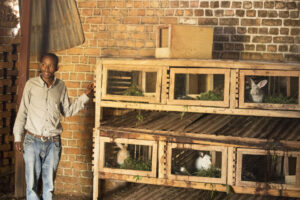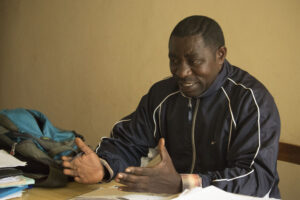The rabbit farms of Gitega and Ruyigi province are struggling to realize their dream. From self-taught people on YouTube looking for information to the lack of improved breeds, medicines, healthy food, sales markets and the death of young rabbits, the path seems strewn with pitfalls. Point.

To lead by good example, the province of Ruyigi has been breeding 6 rabbits since November 2023
“For almost 5 months, I have invested in raising rabbits. I currently have 41 rabbits. I was inspired by the call of the President of the Republic of Burundi to practice rabbit farming to increase household income. explains Nestor Nikuze alias Jocker, one of the administrators of Rutegama hill, Gitega commune and Gitega province.
This forty-year-old father of 8 children claims that he started his breeding with 15 rabbits purchased from traditional rabbit breeders at 4,000 FBu per rabbit. “These are all dead,” he laments before informing that he did not give up, but that he had to obtain supplies of a modern breed from a rabbit grower on the same hill. Which means he continued his breeding.
Unfortunately, he says, he and his colleagues cannot find centers from which to source improved breeds. “Veterinarians are also private individuals who provide services to order. The market is done over-the-counter while rabbit urine does not find a market for sale. witnessed Mr. Nikuze alias Jocker.
However, he notes, rabbits contribute to meeting the basic needs of rabbit farmers’ families. “One day, I missed the fees to pay for my children’s evening classes which were set at 60 thousand FBu. I had to borrow this amount and to repay my debt, I had to sell a rabbit for 30 thousand FBu. To this sum, I added 30 thousand FBu earned in the sale of chickens. indicate M. I am older.
Similarities among rabbit growers
Jean Paul Manirambona is president of the Kazoza cooperative on Rutegama hill, commune and province of Gitega. He notes that the cooperative started rabbit farming with 42 rabbits in June 2023. “They died one after the other and their numbers were reduced to 17 rabbits. Despite this, they have multiplied. Today we have 54. We, four members of the cooperative, manage with our own resources estimated at 40 thousand FBu per head per month to maintain them,” said Mr. Manirambona, before pointing out that the cooperative has dedicated itself to rabbit farming to respond to the rabbit breeding program to address poverty.
And to add: “Seeing the pregnant rabbits, the future is promising. Thousands of rabbits will give birth within three years. Hence the need for a sales market.”
Consolate Habonimana, a native of Rukoba hill, commune and province of Gitega, testifies that she raised rabbits before the program was announced. The thirty-year-old mother of 8 children reports that one of her children was operated on 7 years ago for a tumor thanks to the money made from the sale of rabbits. “The cost of the invoice was 120 thousand FBu. I sold 8 rabbits in my possession to obtain this amount. God helping, my child had surgery. He has recovered and is currently attending the 6th year of basic school”, she rejoices before announcing that she has not given up raising rabbits because of her attachment to their meat. Now, she raises 3 rabbits purchased at 6 thousand FBu each, or 18 thousand FBu. Unfortunately, these are books.
A self-taught man who became a trainer
Eric Vyumvuhore, known under the nickname “Rukwavu” translated into French as rabbit, is a model rabbit farmer from Rutegama hill, Gitega commune and province. Thirty-year-old and father of one child, he says that he started rabbit farming in 2009 as a hobby. This by a rabbit and a book.
“In 2017, I had the chance to be trained for free by a Tanzanian. Which meant that I migrated from traditional rabbit farming to modern rabbit farming,” he says. Mr. Vyumvuhore reveals that he owns 200 rabbits while listing 510 rabbits distributed free of charge in the solidarity chain created by himself. This is to promote rabbit farming.
This winner of the 6th fundamental year confides that rabbit farming is very profitable. For example, he insists, he sells his production at a rate of 9 thousand FBu per kg. Which means that a rabbit weighing 10 kg can easily generate 90 thousand FBu, or 900 thousand FBu for 10 rabbits.
And to continue: “As for rabbit urine, I manage to have more than 10 20 liter cans per quarter. This is therefore more than 200 liters per quarter. Overall, I distribute these rabbit urine free of charge to experiment with crop deworming. » Which, he maintains, avoids the use of chemicals harmful to human health. If he happens to sell them, the cost of a liter is 3,000 FBu. Mr Vyumvuhore says rabbit droppings are a good manure for agriculture.
From the income obtained from rabbit farming, he testifies that he managed to build a dwelling house, hire nine employees paid monthly and obtain 8 Friesian cows and 20 sheep. “These cows provide me with 40 liters of milk per day which I sell at 1400 FBu per liter, or 56,000 FBu which I earn per day,” welcomes Mr. Vyumvuhore before specifying that what marked him the most is that he trains neighboring rabbit growers. This without taking into account the level of his studies.
When “Youtube” becomes a source of training
Joseph Nahimana, a septuagenarian from Gasanda hill, commune and province of Ruyigi, certifies that he welcomed the rabbit breeding program with open arms. “Since August 2023, I have purchased 5 rabbits. Iconveniently, three of them were stolen. However, I have not given up on raising rabbits. Currently, I have 24,” he admits.
Mr. Nahimana recognizes that rabbits are profitable, especially since he has already sold around twenty to buy bean seeds. He also adds that around sixty rabbits were sold to meet daily needs. Around twenty were eaten and 4 given to the children.
Mr. Nahimana is worried that he does not master the techniques of rabbit farming, although he wants to make it his own. “The concepts I use to do it are taken from YouTube”, he says before recalling that even the capital to start rabbit farming is not less. The cost of the modern hutch (wooden planks, rafters, sheets, pipes and mesh), according to Mr. Nahimana, is around 60 thousand Fbu: “This price is not easily affordable for someone practicing subsistence farming. »
He also talks about the lack of improved breed rabbits, pellets, medicines… He regrets that he lost a large number of rabbits from one month to 3 months old.
Ownership of the program rabbit farming, still a long way to go
Valéry Nkunzimana, chief of staff of the governor of Ruyigi province, confirms that the inhabitants of Ruyigi province are gradually adhering to the rabbit breeding program. “Those who have not yet started to do so cite lack of capital as the reason,” he declares.
Mr. Nkunzimana recalls that to lead by good example, the province of Ruyigi has been breeding 6 rabbits since last November. That’s before worrying that they haven’t given birth yet.
He notifies that there is no public veterinary pharmacy in the province of Ruyigi, but that the Provincial Office of Environment, Agriculture and Livestock takes care of monitoring domestic animals.
Jean Claude Havyarimana, head of the animal and fishery production and health department in the province of Gitega, says that the population is joining the rabbit breeding program. It refers to statistics.


Jean Claude Havyarimana, head of the animal and fisheries production and health department in the province of Gitega: “A rabbit breeding center will soon be built on Kiremera hill in the Giheta commune.”
Currently, he emphasizes, rabbits raised in the Giheta commune number 6,981, in the Bugendana commune number 13,325, in the Gitega commune number 25,363, in the Itaba commune numbering 8,104, in the commune of Makebuko numbering 9,113, in the commune of Bukirasazi numbering 6,642, in the commune of Buraza numbering 5,130, in the commune of Gishubi numbering 7,731, in the commune of Ryansoro numbering 3,100, in the commune of Mutaho numbering 14,856 and in the commune of Nyarusange numbering 4,672.
Although the province of Gitega has 3 to 4 improved breeds, Mr. Havyarimana laments the absence of a rabbit breeding center in this constituency. Which can impact their multiplication and, therefore, inbreeding.
Despite this, he announced that a deal to build a breeding center on Kiremera hill in Giheta commune has already been concluded. Mr. Havyarimana deplores the death of rabbits aged between 1 month and 3 months and advises feeding them dried hay for two to three days. He also explains that the province of Gitega has 25 veterinarians without means of travel. Which does not help the support of the program. The lack of a disposal market is also a challenge for the province. Mr. Havyarimana bases his hope on the rabbit meat packaging factory under construction. In the meantime, we can produce to sell in hotels, restaurants…
#Burundi #Eco #Rabbit #breeding #long







